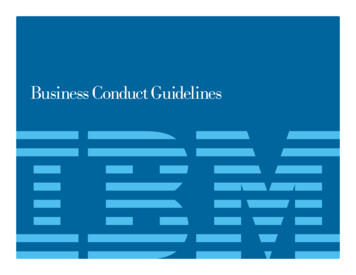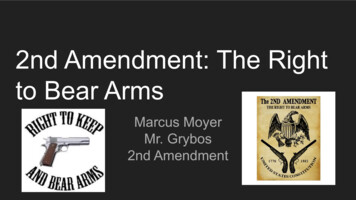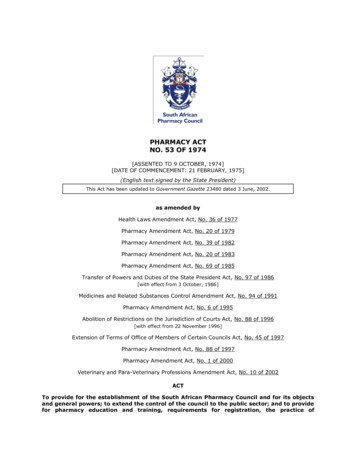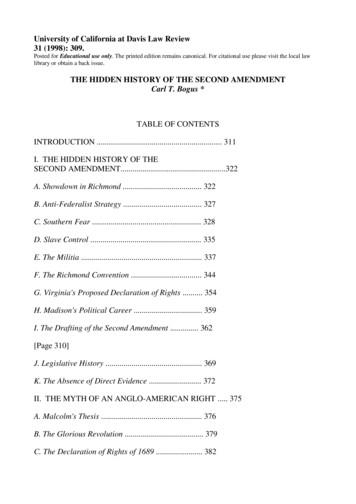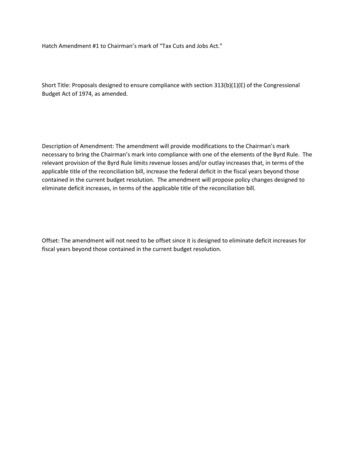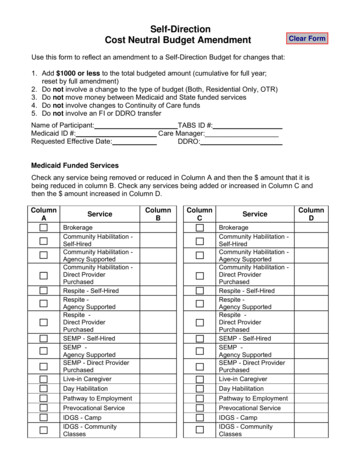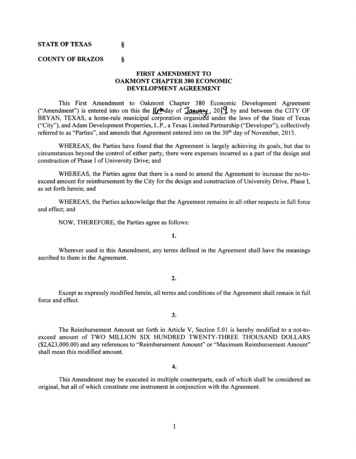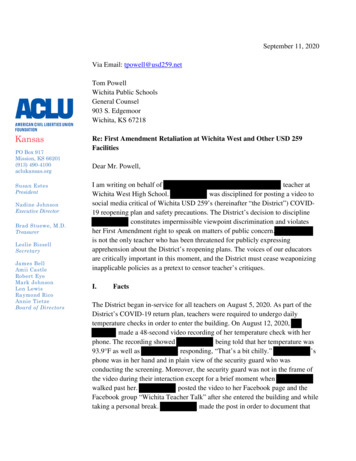
Transcription
September 11, 2020Via Email: tpowell@usd259.netTom PowellWichita Public SchoolsGeneral Counsel903 S. EdgemoorWichita, KS 67218PO Box 917Mission, KS 66201(913) 490-4100aclukansas.orgSusan EstesPresidentNadine JohnsonExecutive DirectorBrad Stuewe, M.D.TreasurerLeslie BissellSecretaryJames BellAmii CastleRobert EyeMark JohnsonLon LewisRaymond RicoAnnie TietzeBoard of DirectorsRe: First Amendment Retaliation at Wichita West and Other USD 259FacilitiesDear Mr. Powell,I am writing on behalf ofteacher atWichita West High School.was disciplined for posting a video tosocial media critical of Wichita USD 259’s (hereinafter “the District”) COVID19 reopening plan and safety precautions. The District’s decision to disciplineconstitutes impermissible viewpoint discrimination and violatesher First Amendment right to speak on matters of public concern.is not the only teacher who has been threatened for publicly expressingapprehension about the District’s reopening plans. The voices of our educatorsare critically important in this moment, and the District must cease weaponizinginapplicable policies as a pretext to censor teacher’s critiques.I.FactsThe District began in-service for all teachers on August 5, 2020. As part of theDistrict’s COVID-19 return plan, teachers were required to undergo dailytemperature checks in order to enter the building. On August 12, 2020,made a 48-second video recording of her temperature check with herphone. The recording showedbeing told that her temperature was93.9 F as well asresponding, “That’s a bit chilly.”’sphone was in her hand and in plain view of the security guard who wasconducting the screening. Moreover, the security guard was not in the frame ofthe video during their interaction except for a brief moment whenwalked past her.posted the video to her Facebook page and theFacebook group “Wichita Teacher Talk” after she entered the building and whiletaking a personal break.made the post in order to document that
the thermometer was not functioning properly and to express her unease that thescreening process was deficient. The same day,was featured in theWichita Eagle expressing her belief that the District was ill-prepared to safelybegin in-person instruction with its current protocols. Megan Stringer, Wichitateachers who want to resign over COVID-19 safety concerns face 1,000 fines,THE WICHITA EAGLE, August 12, 2020 cle244874592.html.On August 13, 2020, Wichita West Principal Mark Jolliffe informedthat he had seen the video she recorded of her temperature screeningthe day before and expressed his belief that it violated Board Policy 1389, whichrequires prior approval to use a concealed camera to record a student oremployee. He also interrogated her about whether she was attempting to recordtheir conversation. Even thoughhad not concealed her phone andtherefore had not violated Policy 1389, she apologized to both Principal Jolliffeand the security guard for her August 12th post.In or around the week of August 17, 2020,was contacted by aKWCH reporter who was seeking to speak with teachers at Curtis MiddleSchool.made a Facebook post about the reporter’s inquiry. Thatsame week she was called into a disciplinary meeting regarding her August 12thpost. During the disciplinary meeting,received a write-up for theAugust 12th video post and was warned she would face further disciplineincluding termination if she continued to post about the District’s preparednessto reopen and resume activities during the pandemic.The ACLU of Kansas has also received reports from other District educators thatthey have been implicitly and explicitly threatened with adverse employmentconsequences if they continue to post their concerns about the District’sreopening plan. These employees wish to remain anonymous out of fear offurther threats and additional retaliation. It is also our understanding that theDistrict has issued a new, more restrictive social media policy in the last fewweeks in order to squelch employee speech about safety conditions andpandemic protocols.As you are undoubtedly aware,is not the only District employee topost on Facebook during work hours. Nor is she the only District employee topost about the District’s response to COVID-19. Another Wichita Westemployee posted support for resuming student activities during the work day on
Monday, August 24 and Tuesday, August 25. This employee has not beendisciplined. See Eg. Exhibit A, Posts by EWM.II.Legal AnalysisPublic employees have a well-established First Amendment right to speak asprivate citizens on matters of public concern. Connick v. Myers, 461 U.S. 138,145 (1983) (“government employees do not relinquish their First Amendmentrights to comment on matters of public interest by virtue of governmentemployment.”). While this right is not absolute, a government employer mustprove speech restrictions are necessary to “prevent disruption and provideefficient public service.” Bailey v. Indep. Sch. Dist. No. 69, 896 F.3d 1176, 1183(10th Cir. 2018). The mere fact that protected speech violates an employer’spolicy is insufficient to justify censorship without evidence of a disruption. SeeGood News Employees Association v. Hicks, 2005 U.S. Dist. LEXIS 5270 (N.D.Cal. 2005) (“the notion of enforcing a policy or law for its own sake is foreign tothe Pickering analysis, which requires the court to focus on reasonablepredictions of workplace disruption. It may be that the policy or law is aimed atavoiding workplace disruption; but if that is so, then the efficacy of the policy orlaw -- not its simple existence -- is the interest that a defendant brings to thecourt.”).Even if the speech creates a disruption, the government must show the speech atissue “is so disruptive to the [employer’s] operations as to outweigh [theemployee’s] interest in the speech.” Trant v. Oklahoma, 754 F.3d 1158, 1166(10th Cir. 2014). Protected speech made during work hours is not intrinsicallydisruptive even where the speaker momentarily diverts time away from theirwork tasks to engage in speech. See e.g. Rankin v. McPherson, 483 U.S. 378,389 (1987) (finding that plaintiff’s comment to a co-worker regarding theassassination attempt on President Reagan was not disruptive despite thestatement being made “at the workplace”). Additionally, protected speech thatprompts conversation amongst co-workers during work time is not sufficientlydisruptive to outweigh employee speech interests. City of Wichita v. Wulf, 883F.2d 842, 851, 862 (10th Cir. 1989) (finding insufficient evidence of disruptiondespite testimony that “everyone was talking about” the plaintiff’s lettercriticizing the police department). Moreover, tension between the speaker andthe target of critical speech “does not render [the speaker]’s speech unprotected.”Prager v. LaFaver, 180 F.3d 1185, 1191 (10th Cir. 1999) (finding discomfort ofinteroffice tension between whistleblower and supervisor accused of misconductdid not justify punishment of whistleblower’s speech); see also Getz v. Bd.
County Comm’rs, 194 F. Supp. 2d 1154, 1166 (D. Kan. 2002) (holding coworkers not wanting to work with plaintiff because of her speech did not justifydiscipline).engaged in protected First Amendment speech and the District hadno countervailing interest that justified disciplinary censorship.’sFacebook post containing a video of her temperature screening was clearlyspeech on a matter of public concern, as it communicated information about theadequacy of the District’s COVID-19 safety protocols. There should be nodispute as to the meaning and purpose of this post since the District’sdisciplinary write up grouped the post with “other occasions” whenposted about the District’s handling of the pandemic. Moreover,’sinterview with the Wichita Eagle and other social media posts made in herpersonal time expressing concerns about the District’s school reopening plansequally constituted speech on a matter of public concern.Next, the District has failed to articulate any legitimate concerns that’s speech would cause a disruption severe enough to warrant censoringher from speaking on one of the most important issues facing society today. TheDistrict premised its disciplinary action and prior restraint on future speech onthree equally unavailing justifications: (1) the recording and posting violatedBoard of Education policies regarding video recordings; (2) the recording wasposted during work time; and (3) the recording would be viewable by her coworkers during work time. The District’s warning letter does not claim that’s violation of the surreptitious recording policy constituted a disruption– only that the security guard found it offensive. Further, notwithstanding rote,generalized assertions that’s post was distracting, the District hasnot expanded upon how her post was disruptive to the school’s operations.Indeed, the only potentially disruptive effect the District could manufacture isthat other teachers might receive a notification of her post from Facebook andwould accordingly see what she posted during worktime. Respectfully, it is not’s posts that are creating a disruption but rather other employees’use of push notifications from the Facebook application, which can be easilydisabled.It is also important to note that the District has not deemed disruptive severalFacebook posts by employees, also made during work time, that support theDistrict’s COVID-19 reopening protocols. The employees making thesesupportive posts are also “devoting work time to the propagation of theirpersonal views” and “publishing their views where they may be seen by multiple
co-workers at the time of publication.” The only difference between’s posts and those of employees supporting the District are theviewpoints that they express. The District’s decision to target speech critical ofits reopening plans while permitting supportive speech exposes the pretextualnature of its claims of disruption. Independently, this type of viewpointdiscrimination is presumptively unconstitutional.III.ConclusionAs a remedy, we ask that the District rescind the write up it issued toand advise her that she may continue to post her views about theDistrict’s reopening protocol without any fear that her employer will furtherinterfere with her right to free speech. The District should also issuean apology for disciplining her. Additionally, we urge you to ceasethreatening and intimidating other teachers and employees for voicing criticismsof the District’s reopening plan.This letter is an attempt to resolve this matter amiably. Please contact us at (913)490-4114 at your earliest convenience so that we can avoid the need for furtherlegal action.Sincerely,Lauren BondsLegal Directorlbonds@aclukansas.orgSharon BrettSenior Staff Attorneysbrett@aclukansas.orgcc: Mark JolliffeWichita West High School Principalmjolliffe@usd259.net820 S. OsageWichita, KS 67213
EXHIBIT A
Wichita Public Schools . General Counsel . 903 S. Edgemoor . Wichita, KS 67218 . Re: First Amendment Retaliation at Wichita West and Other USD 259 Facilities . Dear Mr. Powell, I am writing on behalf of teacher at was disciplined for posting a video to social media critical of Wichita USD 259's (hereinafter "the District") COVID-
